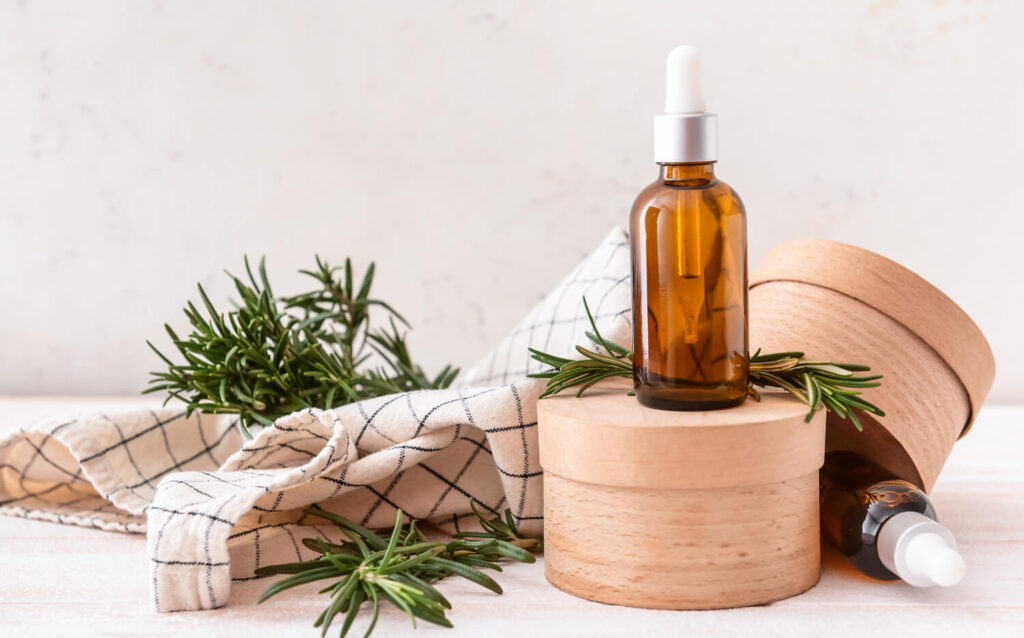Rosemary is a common culinary herb native to the Mediterranean. The name rosemary derives from Latin ros marinus, (translation: dew of the sea), and its botanical name is Rosmarinus officinalis. Beyond its use in the kitchen, rosemary has been used as a medicinal herb for centuries as a tea or an infused oil, however today rosemary essential oil is commonly used to harness the beneficial properties of this herb.
Essential oils are highly concentrated extracts of plant matter. They are oils (not soluble in water) and comprised of volatile chemical compounds. Because they are so concentrated, essential oils are very potent and must be treated with respect. They almost always are diluted into carrier oils before use.
Rosemary essential oil is obtained by steam distillation of twigs and fresh leaves. Its main constituents are terpenes 1,8-cineole, camphor, α-pinene. (Medicines (Basel). 2018 Sep; 5(3): 98). The health benefits of rosemary essential oil center around its antioxidant and anti-inflammatory properties, however research shows that it is also antimicrobial, and supports wound healing, nerve growth and circulation (Antioxidants (Basel). 2023 Mar; 12(3): 680).
Because of these properties, rosemary oil is often applied to the skin (diluted, of course). This is known as topical application. Further, applying preparations that include rosemary oil directly to the scalp may help support hair growth and prevent hair loss.
A trial from 2015 with human participants experiencing androgenic alopecia (male or female pattern baldness) compared rosemary essential oil and the leading OTC hair loss product containing minoxidil. After 6 months, both groups had the same increase in hair count, suggesting that rosemary essential oil was as effective as minoxidil. Additionally, it was more effective against itchy scalp than minoxidil (Skinmed. 2015 Jan-Feb;13(1):15-21).
A second more recent study from 2023 using mice found that applying a hair lotion containing rosemary essential oil stimulated hair growth more than minoxidil. Beyond that, researchers also noted that the rosemary lotion treatment also had a beneficial effect on hair quality, length, mass and appearance (Adv Biomed Res. 2023; 12: 60).
More research is needed to fully understand that relationship between rosemary and hair health. One possibility is that through its beneficial effect on circulation, hair follicles may receive more nutrients, thus preventing them from being starved of blood supply and dying off. Another possibility is byway of its action on nerve endings (Antioxidants (Basel). 2023 Mar; 12(3): 680).
As a natural ingredient that is consumed regularly, the risk to trying rosemary on your hair & scalp is low. However, as with any cosmetic or medicinal product, avoid getting essential oil preparations in your eyes. Because higher concentrations of rosemary oil can potentially irritate the skin it is important to use a sufficiently diluted formulation. As with most things, too much of a good thing is not always helpful. Choose a research-backed formulation that incorporates active ingredients at the correct concentrations for their intended purpose, and is ideally combined with synergistic ingredients. Talk with your doctor before using rosemary essential oil and other essential oils if you are pregnant or breastfeeding.
